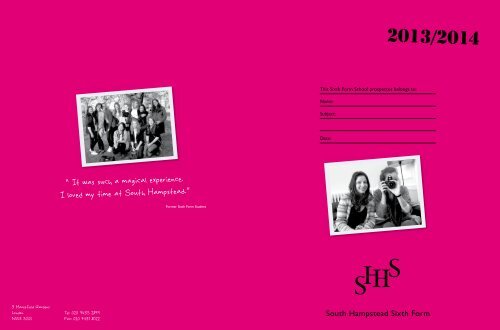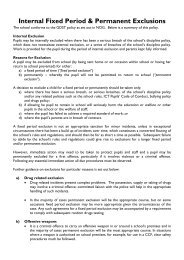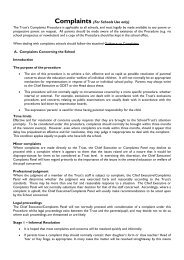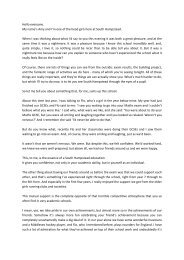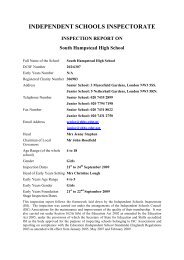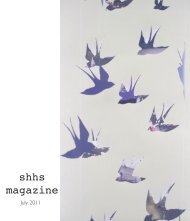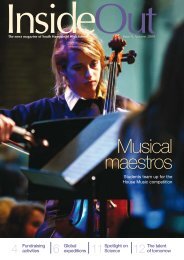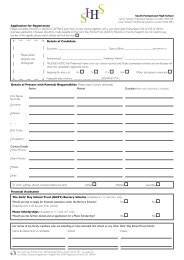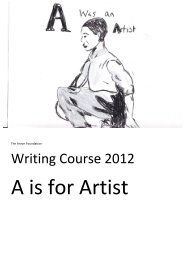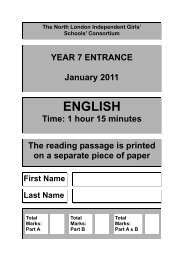SHHS Sixth Form Prospectus - South Hampstead High School
SHHS Sixth Form Prospectus - South Hampstead High School
SHHS Sixth Form Prospectus - South Hampstead High School
Create successful ePaper yourself
Turn your PDF publications into a flip-book with our unique Google optimized e-Paper software.
2013/2014<br />
This <strong>Sixth</strong> <strong>Form</strong> <strong>School</strong> prospectus belongs to:<br />
Name:<br />
Subject:<br />
Date:<br />
“ It was such a magical experience.<br />
I loved my time at <strong>South</strong> <strong>Hampstead</strong>.”<br />
<strong>Form</strong>er <strong>Sixth</strong> <strong>Form</strong> Student<br />
3 Maresfield Gardens<br />
London<br />
NW3 5SS<br />
Tel: 020 7435 2899<br />
Fax: 020 7431 8022<br />
<strong>South</strong> <strong>Hampstead</strong> <strong>Sixth</strong> <strong>Form</strong>
notes<br />
Contents<br />
<strong>South</strong> <strong>Hampstead</strong> <strong>Sixth</strong> <strong>Form</strong><br />
01 Welcome from the Head Girl team<br />
03 Courses and Choices<br />
05 How to choose<br />
09 Art & Design<br />
11 Art History<br />
13 Biology<br />
15 Chemistry<br />
17 Classical Subjects: Latin & Greek<br />
19 Design & Technology: Product Design<br />
21 Drama & Theatre<br />
23 Economics<br />
25 English Literature<br />
27 Geography<br />
29 History<br />
31 Mathematics<br />
33 Modern Languages<br />
35 Music<br />
37 Philosophy<br />
39 Physics<br />
41 Politics<br />
43 Psychology<br />
45 Religious Studies<br />
47 General Studies<br />
48 Speaker Series<br />
49 Physical Education<br />
51 Additional notes<br />
Enjoy!
notes<br />
Welcome from the Head Girl Team<br />
<br />
is the sound of chattering voices and laughter coming through the open door<br />
of the common room. It’s breaktime, and we’re grabbing a coffee and catching<br />
up with friends between lessons. People are chilling out on the sofas; some are<br />
reading books and newspapers, others are just taking the time to relax. The<br />
café in the corner is serving warm croissants and hot chocolate. Just across the<br />
corridor we can see Ms Stevenson, Head of <strong>Sixth</strong> <strong>Form</strong>, sitting at her desk. Her<br />
door is never closed and we’re always dropping by to ask for advice or just<br />
have a chat.<br />
The bell sounds for the start of lessons and we head off to our different classes.<br />
In the <strong>Sixth</strong> <strong>Form</strong> the classes are much smaller, some having as few as four<br />
people. What’s more, we’re people who actively take an interest in the subject<br />
which makes for very lively class discussions. We also get to know our teachers<br />
really well and aren’t afraid to take them on in a debate!<br />
<br />
it would be ‘different’. New subjects immediately spring to mind, from Politics<br />
and Economics, all the way to Philosophy and Psychology. There are also new<br />
options in PE, including yoga, zumba and even rock-climbing. And we’d be<br />
forgiven for forgetting about the new girls, because they hardly feel new for<br />
any time at all!<br />
But that’s not all that’s new in the <strong>Sixth</strong> <strong>Form</strong>. While the school undergoes the<br />
building refurbishment we will have two common rooms – one at Oakwood<br />
and one at the Cumberland Campus – and more responsibility between both<br />
sites. It will be good preparation for university! But while the school buildings<br />
are changing and improving the one thing that hasn’t changed is the spirit of<br />
the <strong>Sixth</strong> <strong>Form</strong>.<br />
notes<br />
<br />
some of us strolling down to Waitrose, or to the local Japanese food shop (a<br />
particular favourite of the <strong>Sixth</strong> <strong>Form</strong>!). Being able to go out for lunch is the<br />
perfect excuse to take a walk in the middle of the day. On the other hand if<br />
you just want a breath of fresh air, the <strong>Sixth</strong> <strong>Form</strong> garden behind Oakwood is<br />
<br />
the days of the summer term when it’s warm enough to work outside during<br />
study periods, but when the English weather intervenes we can always take our<br />
work to the <strong>Sixth</strong> <strong>Form</strong> computer room.<br />
If we’re not eating lunch outside, it’s probably because we’re running a<br />
lunchtime club. On top of all the extra-curricular activities already on offer,<br />
many of us run our own societies including Debating Society, Amnesty and<br />
the new, very popular, Comedy Club. In other positions of responsibility, such<br />
as House Captains and Vice Captains, we have the opportunity to lead our<br />
Houses in competitions and to work with every single year group in the school.<br />
From Isabel, Neha, Martha, Amy and Tamar (not pictured)<br />
The Head Girl Team 2012-2013<br />
01<br />
02
notes<br />
notes<br />
Courses and Choices<br />
The Post-16 Curriculum<br />
<br />
<strong>Form</strong> curriculum, while reducing assessment and providing more “Stretch<br />
<br />
examinations.<br />
All courses are modular with June and January examination sessions. Although<br />
each unit may be taken more than once, students are strongly encouraged to<br />
<br />
at retakes and some may not accept retake students. Not to mention, retaking<br />
<br />
retaking units should be made in conjunction with the Head of Department for<br />
<br />
of the full A Level and is valued as such by UCAS.<br />
What happens at <strong>South</strong> <strong>Hampstead</strong> <strong>High</strong> <strong>School</strong><br />
<br />
Subsidiary (AS) examinations at the end of the year. In the Upper <strong>Sixth</strong>, you will<br />
<br />
<br />
and Physical Education.<br />
<br />
<br />
<br />
<br />
for this is that admissions tutors for competitive courses will be looking for<br />
evidence of a student’s ability to manage a rigorous curriculum, and an<br />
increasing number of students across the spectrum of schools are doing<br />
precisely this. Timetable and set sizes permitting, it may be possible for you<br />
<br />
<br />
<br />
much more independent learning and reading around subjects, if you are to<br />
be able to answer the more challenging questions which examinations will<br />
offer, and to secure good grades. You should therefore expect to undertake<br />
<br />
two years in the <strong>Sixth</strong> <strong>Form</strong>.<br />
AS and A2 Courses<br />
<br />
<br />
that all combinations will be possible. We will, of course, do our best to<br />
accommodate them. If a particular combination is not possible,<br />
we will inform you by early May.<br />
Teaching groups vary in size and are generally<br />
large enough to be stimulating but small enough<br />
<br />
Music, groups may be as small as three, whereas<br />
for English or a science they may average<br />
<br />
“Everything shifts in the <strong>Sixth</strong> <strong>Form</strong>,<br />
everyone feels ‘new’.”<br />
<strong>Sixth</strong> <strong>Form</strong> Student<br />
“Classes are small, so you can really get stuck into<br />
a subject. Teachers always have time for you too.”<br />
<strong>Sixth</strong> <strong>Form</strong> Student<br />
03 04
notes<br />
notes<br />
How to choose<br />
Universities are looking increasingly for a contrasting discipline amongst the four<br />
subjects. They consider it important both from a career point of view and from<br />
a broader educational perspective that science graduates can communicate and<br />
that arts graduates can think logically and are reasonably numerate. A number<br />
of medical schools, for example, will give preference to applicants who offer an<br />
arts subject as one of their A or AS Levels. We strongly recommend, therefore,<br />
that you choose a broad combination of subjects.<br />
<br />
consider a number of factors, including:<br />
The subjects you enjoy and would like to study further<br />
Your ability in the subjects you would like to study<br />
Implications for higher education and careers<br />
The following subjects are likely to be offered in September 2013:<br />
Art<br />
History: Modern and Tudor<br />
Biology<br />
History: Early Modern and Medieval<br />
Chemistry<br />
Mathematics (with Mechanics) or<br />
Design Technology Mathematics (with Statistics) or<br />
Economics<br />
Mathematics and Further Mathematics<br />
English<br />
Music<br />
French<br />
Philosophy<br />
<br />
Physics<br />
<br />
Psychology<br />
<br />
<br />
Spanish<br />
History of Art<br />
Theatre Studies<br />
Latin<br />
Although many of these subjects will be familiar to you, remember that<br />
<br />
<br />
essay writing, extensive reading or practical work. In others, you will have to<br />
<br />
<br />
descriptions carefully and consult Heads of Departments. Ask your teachers if<br />
you have the ability to do well in their subject. Find out about subjects which<br />
are new in the <strong>Sixth</strong> <strong>Form</strong>. These will be introduced to existing <strong>SHHS</strong> students<br />
at the ‘Into the <strong>Sixth</strong>’ evening and to external applicants during the <strong>Sixth</strong> <strong>Form</strong><br />
tours in the autumn.<br />
Choosing subjects you enjoy usually means that you will be more committed<br />
to them and are likely to develop your potential in them.<br />
<br />
However, some science and social science courses have general patterns of<br />
A Level requirements of which you must be aware. If you are thinking of<br />
applying for these, it is essential that you seek specialist advice from Ms<br />
Stevenson, Head of <strong>Sixth</strong> <strong>Form</strong>; Mr Bradbury, Deputy Head; and Dr Everall,<br />
Head of Science.<br />
The following list sets out recommended subject combinations for science,<br />
economics and architecture courses:<br />
Medicine and Veterinary Science - The safest combination to enable you to<br />
have the widest choice of medical schools is Chemistry, Biology, Physics or<br />
Mathematics and an arts-based subject.<br />
Dentistry Essential: Chemistry and one or two sciences<br />
Engineering Essential: Mathematics and Physics<br />
Natural Sciences Essential: two sciences but most Cambridge<br />
colleges prefer three<br />
Biological Sciences Essential: Biology<br />
Desirable: Chemistry<br />
Physical Sciences<br />
Physics Essential: Physics and Mathematics.<br />
Chemistry Essential: Chemistry<br />
Desirable: Physics or Mathematics<br />
Economics Desirable: Mathematics<br />
[particularly if you intend to study<br />
economics at university].<br />
Architecture Desirable: Mathematics<br />
“You are encouraged to do what you love as<br />
well as what you have to do.”<br />
05 06<br />
<strong>Sixth</strong> <strong>Form</strong> Student
notes<br />
How to choose -‐ continued<br />
notes<br />
Personal Development<br />
At <strong>South</strong> <strong>Hampstead</strong>, we encourage you to become<br />
an independent learner, in preparation for university<br />
and life in the future. One of the important ways<br />
in which we do this is through the exciting projects<br />
you will complete after AS examinations. Throughout<br />
the <strong>Sixth</strong> <strong>Form</strong>, we will give you plenty of support<br />
and teach you to manage your time, so that you can<br />
juggle academic commitments with extra-‐curricular<br />
activities and become a well-‐rounded person.<br />
Taking on responsibilities, leading and participating<br />
in clubs and societies and generally helping us run the<br />
school will enable you to develop essential skills, such<br />
as leadership and working in a team, presentation,<br />
communication, information technology and problem-solving,<br />
amongst others.<br />
Careers<br />
Careers advice in the <strong>Sixth</strong> <strong>Form</strong> focuses on helping you to make the right<br />
choices when you leave school. The Head of Careers, Head of <strong>Sixth</strong> <strong>Form</strong> and<br />
<strong>Sixth</strong> <strong>Form</strong> tutors work as a team to guide and advise you. During the Lower<br />
<strong>Sixth</strong> year, you will be encouraged to investigate higher education and career<br />
<br />
<br />
<br />
The higher education programme will kick off in the Spring term of the Lower<br />
<strong>Sixth</strong> with talks by admissions tutors about UCAS and Oxbridge. These are<br />
followed up by a UCAS Evening for you and your parents and individual<br />
discussions with your tutor. After AS examinations, you will be able to visit<br />
universities. The Head of Careers will arrange for you to have a mock higher<br />
education interview in the Autumn term of the Upper <strong>Sixth</strong>.<br />
The Careers Department organises careers and gap year talks, visits to<br />
conferences and work experience courses. We expect every girl to have<br />
completed two weeks of work experience by the start of the Upper <strong>Sixth</strong>.<br />
Work experience must take place during the school holidays.<br />
French Work Experience<br />
07 08
notes<br />
notes<br />
Art and Design<br />
We offer a broad range of skills in the Art Department at A Level, from oil<br />
<br />
<br />
greater depth. We set challenging projects and expect you to respond with<br />
equally demanding outcomes. The creative process which takes place can be<br />
<br />
a self-motivating and self-perpetuating ethos which gives rise to a questioning<br />
and critically aware student by the end of the two years.<br />
Why study Art and Design<br />
Art and Design can be happily combined with and complements many subjects<br />
such as Art History or D&T or Theatre Studies; it is an accredited Advanced<br />
<br />
of subjects are not suitable for some courses at university.<br />
You may want to study for a career in one of the visual art and design<br />
disciplines; an Art Foundation Course is the essential platform for this. It will also<br />
give you a creative balance in your curriculum alongside other subjects. <strong>Form</strong>er<br />
<br />
Nina Fowler, Lucy Levene and Zoe Mendelson, are now working as painters,<br />
<br />
fashion and textile designers and senior curators in major art galleries.<br />
What will you study<br />
We offer a multitude of disciplines, processes and skills, as well as visits to<br />
galleries to complement your studio work. You may choose to concentrate<br />
on one or two of these as the course progresses. We aim to develop<br />
your individual work through: intellectual, imaginative, creative and intuitive<br />
powers; investigative, analytical, practical and expressive skills; aesthetic<br />
understanding and critical judgement; understanding of contexts and<br />
inter-relationships between art, craft and design; knowledge of art, craft<br />
and design in contemporary society and in other times and cultures.<br />
AS <br />
activities based in a foundation of drawing.<br />
<br />
student development.<br />
A2 <br />
<br />
student development, tutorials, continuous evaluation.<br />
Unit 4: Externally set assignment. <strong>School</strong>-launched theme, negotiated<br />
personal development and review.<br />
How will you study<br />
Practical work provides the main part of the course, although there is a written<br />
<br />
some workshops in life drawing, etching or sculpture during the course.<br />
While much of the work is studio-based, students will need to meet the<br />
demands of the subject through active research, gallery visits and a broad<br />
engagement in the whole area of art and design. We also offer a regular study<br />
visit abroad and involve students with visiting artists and lecturers.<br />
What do you need to start the course<br />
<br />
<br />
<br />
<br />
www.edexcel.com.<br />
“You will never believe it! I got a prize for<br />
Outstanding Foundation Fine Art Student<br />
of the Year (for Sculpture)! Woop...<br />
Thank you so much, I wouldn’t have been able<br />
to do it without your help and the <strong>SHHS</strong><br />
art department!”<br />
<strong>Sixth</strong> <strong>Form</strong> Student<br />
09 10
notes<br />
notes<br />
Art History<br />
Why study Art History<br />
If you enjoy looking at works of art in their original settings and in museums<br />
and galleries, or if you are curious about the value and status of art in society,<br />
<br />
training the eye to think in its own way, along with the mind, and it is one of the<br />
small number of disciplines which attempt to understand the creative impulse.<br />
It is often only through an examination of the art of a culture that we gain<br />
a wider appreciation of the values, resources and aspirations of that culture.<br />
Art History complements arts-based subjects such as art, English, history,<br />
theatre studies, classical and modern languages. It also offers opportunities<br />
for science students to develop new critical skills.<br />
What will you study<br />
At AS, you will acquire a basic knowledge of architecture, painting and sculpture<br />
<br />
<br />
<br />
styles, themes, materials, techniques, the purpose of art and the role of the<br />
<br />
paintings, sculptures and buildings which have made a major contribution to<br />
our cultural history.<br />
<br />
<br />
framework of social history - economics, politics, philosophy, religion, science,<br />
psychology, archaeology and technology.<br />
How will you study<br />
Courses are structured around classroom discussions, note-taking, visual images<br />
and visits to galleries in and around London and abroad when appropriate.<br />
What do you need to begin the course<br />
No previous knowledge of art or history is required but enthusiasm for the arts<br />
<br />
<br />
<br />
<br />
<br />
“Sorry that I got so argumentative in lessons<br />
but it was only because I was so interested and<br />
inspired by the wonderful pictures on the walls.”<br />
<strong>Sixth</strong> <strong>Form</strong> Student<br />
11 12
notes<br />
notes<br />
Biology<br />
Why study Biology<br />
Studying Biology enables you to have a better understanding of many of the<br />
<br />
covers some of the most important aspects of human life.<br />
<br />
interesting. There are many university degree courses that you can go on to<br />
study with A Level Biology. These include Biological Sciences, Biochemistry,<br />
Medicine, Dentistry, Veterinary Science, Natural Sciences, Biotechnology,<br />
Microbiology and Biomedical Sciences. It is important that you look at the<br />
<br />
possible courses are Marine Biology, Anthropology, Archaeology, Physiotherapy,<br />
Psychology, Horticulture, Nursing and Midwifery and many others.<br />
As well as appealing to those interested in a career in science, Biology appeals<br />
to humanities students who wish to broaden their knowledge base by having<br />
a science subject in their AS choices.<br />
What will you study<br />
AS <br />
<br />
<br />
A2 <br />
<br />
<br />
The practical skills element of the course is aimed to test students’ practical<br />
skills, graph drawing, table drawing, analytical and evaluative skills. These are<br />
tested in three papers, two of which are practical (qualitative and quantitative<br />
papers) and one is written (evaluative paper). During the year, we aim to<br />
<br />
complement the course.<br />
How will you study<br />
At A Level there is an increased emphasis on students learning independently.<br />
There is an increased amount of practical work to prepare students for the<br />
practical skills element of the course. In September in the AS course, we go on<br />
<br />
<br />
<br />
What do you need to begin the course<br />
<br />
Science and an additional science. You will need a minimum of a grade C at AS,<br />
<br />
<br />
from the course.<br />
<br />
<br />
<br />
13 14
notes<br />
notes<br />
Chemistry<br />
Why study Chemistry<br />
<br />
<br />
<br />
make ionic compounds, since aluminium chloride is covalent; the third electron<br />
<br />
<br />
<br />
new and intellectually-challenging concepts: these concepts are powerful tools<br />
which we then apply to familiar topics, such as electron structure, bonding and<br />
<br />
new principles to understand and apply - and satisfying, since it explains many<br />
familiar observations in a thought-provoking way.<br />
What will you study<br />
<br />
Although the course contains a lot of factual material, the emphasis is on<br />
the recognition and appreciation of the inter-linking patterns which form a<br />
distinctive feature of this subject and, for this reason, it is highly-regarded by<br />
non-related subjects at university and by a variety of careers. Students who<br />
intend to read medicine, veterinary science or dentistry at university must<br />
take A Level Chemistry, and those intending to read paramedical subjects<br />
or biological sciences are strongly advised to take it.<br />
How will you study<br />
Teaching at A Level consists of a lot of discussion of new concepts and their<br />
application to the familiar pattern of knowledge, with lots of questions in both<br />
directions and, of course, practical work. There is little note-taking or dictation.<br />
<br />
<br />
<br />
<br />
visit the Chemistry department at University College London.<br />
What do you need to begin the course<br />
<br />
Double Award Science. Students who found chemical calculations challenging<br />
<br />
<br />
You will need a minimum of a grade C at AS, if you wish to study this subject<br />
<br />
<br />
<br />
15 16
notes<br />
Classical Subjects/Latin and Greek<br />
Latin<br />
“Latin is the first subject we do in life entirely for its own sake. A<br />
Classics degree leads to almost any job in the world. It gives one a<br />
disinterestedness in the study of any subject. Disinterestedness is not<br />
being uninterested, quite the opposite, it is a love of studying without<br />
any practical result intended: it gives the soul a peace, an inner<br />
control, a quiet joy beyond words.”<br />
(anon)<br />
Why study Latin<br />
Latin at A Level is an intellectually demanding and rigorous course, one which is<br />
consequently very rewarding. Students of Latin develop a sensitive and analytical<br />
approach to language generally, as well as a competence in classical Latin, an awareness of<br />
<br />
and make informed personal response to literature studied in the original language.<br />
<br />
mathematics, modern languages and the sciences. Beyond A Level, a degree in Classics<br />
is very versatile leading to such varied careers as the law, politics, the Civil Service,<br />
academia, the police service, the world of business, journalism or you could even become<br />
<br />
This course is suited for you if: you are a lateral thinker; you want to develop a logical<br />
brain and become more analytical; you love reading literature; you enjoy history; you like<br />
to question “why” and make comparisons between an ancient society and culture and<br />
our own; or you simply love Latin!<br />
What will you study<br />
In the Lower <strong>Sixth</strong>, you will study two prescribed authors from a range of genres such<br />
as epic poetry, elegy, historical prose and oratorical speeches. You will also practise your<br />
unseen translation skills.<br />
In the Upper <strong>Sixth</strong>, you will continue with the study of two new authors (one verse<br />
and one prose) as well as developing your language skills further by practising the art<br />
of prose composition, comprehension and unseen translation.<br />
How will you study<br />
You will be encouraged to think for yourself, draw your own conclusions, and consider<br />
<br />
be opportunities to supplement your classical education with lectures, museum and<br />
theatre visits and university classical open days.<br />
What do you need to begin the course<br />
<br />
<br />
<br />
<br />
<br />
Classical Greek<br />
Why study Classical Greek<br />
You are a problem solver, a lateral thinker and thrive on an intellectual challenge. You<br />
love the demands of reading an ancient language and relish the opportunity to read<br />
and discuss some of the greatest, if not the greatest works of literature ever composed,<br />
in their original language.<br />
<br />
the study of Latin, history, mathematics, philosophy, politics, modern languages and the<br />
sciences.<br />
What will you study<br />
<br />
<br />
<br />
<br />
AS <br />
<br />
A2 <br />
<br />
How will you study<br />
<br />
genres such as epic poetry, tragedy, history and philosophy. You will be encouraged to<br />
read widely around the subject, research and give presentations on authors and aspects<br />
<br />
<br />
enhanced by regular museum, lecture and theatre visits.<br />
What do you need to begin the course<br />
<br />
<br />
<br />
<br />
<br />
notes<br />
nil desperandum<br />
17 18
notes<br />
Design and Technology: Product Design<br />
Why study Design and Technology: Product Design<br />
<br />
<br />
<br />
either exclusively or as a combination of focus material areas (although<br />
<br />
Working through the AS course, students divide their time between two<br />
modules. One involves compiling a rigorous study of a product of their choice<br />
involving analysing, redesigning, modelling and testing. The study is presented as<br />
an e-portfolio which will include digitally recorded still photographs and videos<br />
<br />
The other module culminates in a day of creativity, where students present<br />
designs and model a product based on a pre-revealed theme. Success relies<br />
on focused research, gathering a three dimensional scrap bag of products and<br />
information and advanced modelling skills developed through the year. A short<br />
<br />
moral implications of their designs and the marketability of the product.<br />
<br />
<br />
supported by a portfolio and a formal examination. Students study a range<br />
of manufacturing methods; social, moral, cultural and ethnic dimensions that<br />
relate to technological decisions; sustainable development, health and safety<br />
considerations and European development; and constraints that economic and<br />
ergonomic factors place on designing and making of products. The designed<br />
<br />
as full size prototypes. If appropriate the products will be entered into local and<br />
national competitions.<br />
What will you study<br />
<br />
OCR Advanced Subsidiary GCE in Design and Technology:<br />
Product Design H053<br />
AS <br />
(three components, including written examination)<br />
AS <br />
OCR Advanced GCE in Design and Technology: Product Design H453<br />
A2 <br />
A2 <br />
How will you study<br />
<br />
What do you need to begin the course<br />
<br />
<br />
<br />
<br />
notes<br />
The course offers the depth of design awareness required for further study at<br />
university level in courses such as Architecture and Engineering, as well as the<br />
practical and analytical skills required to pursue further study in Product Design.<br />
However, the skills obtained are transferable into many disciplines, and previous<br />
students have moved on to courses in Dentistry and Environmental Science,<br />
for instance.<br />
19 20
notes<br />
notes<br />
Drama and Theatre<br />
Why study Drama and Theatre<br />
This is a new course from AQA. It is vibrant and encourages much more of an<br />
active approach to exploring drama. If you enjoy acting, reading plays, going to<br />
the theatre and writing about drama, you will enjoy this course. Whether you<br />
want to perform in productions, direct or design you need to be a good team<br />
<br />
What will you study<br />
AS<br />
<br />
You will explore a set play through workshops and study the<br />
<br />
During the course you will also go to see live productions. The<br />
examination will test your knowledge on the effectiveness of<br />
a performance you have seen. It will also test your knowledge<br />
of the set play in performance.<br />
<br />
How will I study<br />
<br />
visits are also an obligatory part of the course. Compulsory after-school rehearsals<br />
are a feature of this course and students need to offer this commitment. Students<br />
<br />
element of this examination.<br />
<br />
<br />
What do I need to start the course<br />
You need to really like drama.<br />
<br />
In this section you will perform a text of your choice in a<br />
theatrical style of your choosing. Notes that accompany the<br />
<br />
Assessed by both your teacher and an external moderator.<br />
A2<br />
<br />
<br />
workshops. This time the examination questions test your<br />
conceptual knowledge of the play as a whole.<br />
<br />
‘All the world’s a stage!’<br />
<br />
Here you are required to devise an original piece of drama<br />
in a theatrical style of your choosing.<br />
Assessed by both your teacher and an external moderator.<br />
21 22
notes<br />
notes<br />
Economics<br />
Why study Economics<br />
Economics will equip you with the tools to view and analyse the world in a<br />
<br />
to markets and government policies, then you will enjoy this subject by<br />
investigating some of the problems that economists face; from the problem<br />
of obesity to the economic consequences of climate change. You will also<br />
study some of the macroeconomic problems that governments face, from<br />
<br />
It has a bit of everything in it – history, politics, geography and maths – to keep<br />
it relevant and interesting.<br />
What will you study<br />
AS <br />
to the nature of economics and examines how the markets<br />
allocate resources from the oil market to the housing market. It<br />
analyses the nature of market failure, and investigates the extent<br />
to which a particular market requires government intervention.<br />
Health Care provision and university tuition fees are just a few<br />
of the issues investigated.<br />
<br />
measures of economic performance by looking at a range<br />
of economic problems that a country faces, from recessions<br />
to unemployment. Students investigate the instruments<br />
governments can use to overcome these problems and evaluate<br />
their impact on the economy.<br />
<br />
choice questions and one data response question out of a choice of two<br />
<br />
A2<br />
Business Economics and the Distribution of Income - This<br />
unit investigates various markets and assesses the extent to<br />
<br />
to the telecommunications market. The labour market is also<br />
considered where we will look at issues such as wage inequality<br />
and attempts by governments to produce a “fairer” society.<br />
Unit 4:<br />
The National and International Economy - This Unit investigates<br />
a range of topics in a global context, from the impact of EU<br />
membership on the economy to the rapid development of<br />
<br />
critically evaluated and students are encouraged to debate<br />
topical economics issues.<br />
<br />
response question out of a choice of two questions and one essay from<br />
<br />
How will you study<br />
The lessons will be a mixture of teacher-led activity, workshops and student<br />
investigations and projects. You will be expected to have a strong interest in<br />
current economic affairs and business events and issues.<br />
What do you need to begin the course<br />
A grade A in mathematics and a relevant humanities subject (e.g. history or<br />
geography). It is not a requirement to have studied economics or business<br />
<br />
<br />
It is recommended that those considering economics as a possible degree<br />
course, particularly a BSc, should consider studying mathematics at A Level<br />
as well.<br />
<br />
<br />
“Boom, deficit, tax, recession! When there is so<br />
much happening in the world, you cannot afford<br />
NOT to do economics.”<br />
<strong>Sixth</strong> <strong>Form</strong> Student<br />
23 24
notes<br />
notes<br />
English Literature<br />
Why study English Literature<br />
If you enjoy reading and talking about books, then you are likely to enjoy<br />
<br />
on discussion and analysis, leading you to develop your own interpretations of<br />
<br />
Stimulating class discussion, extensive reading, and the development of your<br />
own critical responses are the key features of English Literature A Level. English<br />
Literature can be combined with any other A Level because of its emphasis on<br />
clear, analytical communication in both the written and the spoken word.<br />
What will you study<br />
<br />
<br />
countries. You will learn about the history of literature and acquire a sense<br />
of how different texts relate to others in their own time, and earlier periods.<br />
<br />
political context, as well as a literary one.<br />
At AS you will study six texts. We aim to cover a range of different periods and<br />
<br />
<br />
Plath. The texts we choose are demanding; they will challenge you as readers<br />
<br />
<br />
here the emphasis is on independent interpretation and powers of argument.<br />
<br />
You will also be expected to read widely outside the examination syllabus in<br />
order to develop and deepen your appreciation of the cultural and historical<br />
contexts in which your texts were written.<br />
How will you study<br />
There is one examination at AS and two coursework assignments: a prose<br />
study of two novels and a creative writing assignment in which you will<br />
<br />
<br />
poetry and prose set texts and another text of your choice from a shortlist.<br />
Teaching takes place through discussion in the classroom and you will be<br />
expected to complete an essay each week. We also aim to complement study<br />
with trips to relevant theatre productions and visits from writers.<br />
What do you need to begin the course<br />
You will need a minimum of two grade As in English and English Literature if<br />
you wish to study this subject at AS and a minimum of a grade C at AS, if you<br />
<br />
<br />
<br />
Busie old foole,<br />
unruly Sunne,<br />
Why dost thou thus,<br />
Through windowes<br />
and through curtaines<br />
call on us<br />
25 26
notes<br />
notes<br />
Geography<br />
Why study Geography<br />
<br />
<br />
East has forced the United Nations to consider whether Iran really does<br />
only intend to use its nuclear facilities for electricity generation. The on-going<br />
recession has forced our government to make cutbacks to spending on<br />
transport, healthcare, education, international aid and infrastructure projects<br />
that will affect our geography for the rest of your life.<br />
<br />
<br />
on from being about neatly-coloured maps to a dynamic, relevant subject<br />
about the economy, society and environment we live with. It goes well with<br />
any subject combination: it’s the only subject that’s both an art (BA) and<br />
a science (BSc) at university. It’s now one of the most popular subjects at<br />
university - and at A Level too.<br />
What will you study<br />
AS<br />
Physical geography: glaciers, coasts, rivers and deserts. Is it really that bad<br />
when glaciers melt Should our eroding coastlines just be left to nature<br />
<br />
out of a desert<br />
<br />
<br />
China and India’s economic growth be restricted Who are the winners and<br />
losers in global trade Do campaigns like Fair Trade actually work What<br />
weather hazards does global warming have in store Is it legal for insurers<br />
<br />
a complete waste of money<br />
<br />
How will you study<br />
<br />
takes place during two one-day visits: one to investigate river dynamics and<br />
<br />
<br />
<br />
<br />
What do you need to begin the course<br />
<br />
considered. You will need a minimum of a grade C at AS, if you wish to study<br />
<br />
<br />
More information is available at:<br />
<br />
Human geography: urban, rural, resources and tourism. Who’s to blame for<br />
crime: criminals or society Will all of our villages eventually contain no services<br />
Is global tourism destroying environments and cultures Can nuclear energy<br />
solve our energy problems<br />
<br />
A2<br />
<br />
<br />
<br />
<br />
27 28
notes<br />
History<br />
Why study History<br />
You should study History if you are intrigued by<br />
the past and are fascinated by studying events,<br />
cultures and time periods different from your own.<br />
It is essential that you enjoy reading, have an<br />
inquiring mind and are eager to share your ideas<br />
and opinions with the rest of the group.<br />
History fosters high levels of literacy, the close<br />
analysis of sources, independent thinking and the<br />
ability to select and organise information. The<br />
way History is taught at <strong>South</strong> <strong>Hampstead</strong><br />
encourages work habits and research skills which<br />
prepare students for the independence of university<br />
study. History is a highly respected subject, both<br />
at A Level and at university and historians move<br />
on to a wide range of professions in the media,<br />
law, the Civil Service and, of course, education to<br />
name just a few. The subject combines very well<br />
with a range of arts subjects and languages and<br />
has provided a refreshing contrast for students<br />
studying the sciences.<br />
What you will study<br />
<br />
Modern/Tudor (MT) - The Role of the Individual<br />
<br />
<br />
<br />
Unit 4: Change and Continuity in Chinese History, focusing on Chiang<br />
<br />
Early Modern/Medieval (MM) - Nations and States<br />
<br />
<br />
<br />
<br />
How will you study<br />
Students are required to prepare thoroughly beforehand so that lessons are<br />
mainly discussion based. There are opportunities to attend <strong>Sixth</strong> <strong>Form</strong> lectures<br />
and we invite outside speakers to our History Society, which is compulsory for<br />
<strong>Sixth</strong> <strong>Form</strong> historians.<br />
What do you need to begin the course<br />
<br />
<br />
<br />
Examination Board: AQA - www.aqa.org.uk<br />
29 30
notes<br />
Mathematics<br />
Why study Mathematics<br />
<br />
solve equations which are more complex than quadratics, how statistics can<br />
win an argument, or what happens to vehicles in a collision What about the<br />
number of staff needed to answer the phones in a call centre Or even, how<br />
to shoot a monkey out of a tree Any of these questions, and many more, can<br />
be answered by studying Mathematics at A Level.<br />
Mathematics is recognised as one of the most respected and challenging<br />
A Levels, and, for this reason, is highly rated by a wide variety of university<br />
courses and employers. Mathematics A Level can lead to university courses<br />
in mathematics, sciences, medicine, engineering, psychology, economics,<br />
archaeology and careers in almost anything.<br />
If you are someone who wants to study Mathematics for its own beauty, as well<br />
as its uses, then you should also consider Further Mathematics. Here you can<br />
explore the mysteries of hyperbolic functions, complex numbers (made using<br />
square roots of negative numbers), what keeps a roller coaster on the track<br />
in a loop-the-loop and how to structure a formal proof.<br />
What will you study<br />
All students take the same core mathematics modules and choose between<br />
statistics or mechanics for their applied section.<br />
AS<br />
Core mathematics: calculus, trigonometry, factor and remainder theorems, graph<br />
sketching, logarithms and exponentials, numerical methods, binomial expansion,<br />
and indices.<br />
<br />
formal correlation, conditional probability and the Normal distribution.<br />
Statistics: Binomial and Poisson distributions, uniform distribution and<br />
hypothesis testing.<br />
Mechanics: Projectiles, centre of mass, collisions, displacement, forces<br />
and moments.<br />
Further Mathematics (AS and A2)<br />
Further mathematicians cover all of the material above, including both statistics<br />
and the mechanics elements and, in addition, further pure mathematics and one<br />
module of extended applied, chosen by the group.<br />
Further Pure: matrices, complex numbers, differential equations, Maclaurin and<br />
Taylor expansions, hyperbolic functions, polar co-ordinates, further calculus,<br />
inequalities.<br />
How will you study<br />
Mathematics is a challenging course. Lessons include discussion and examples,<br />
<br />
order to succeed. Assessment is by modular examination, with three modules<br />
to each part of the course.<br />
What do you need to begin the course<br />
<br />
<br />
<br />
<br />
Exam board: Edexcel, www.edexcel.com<br />
notes<br />
Mechanics: vectors, resolving forces, Newton’s laws of motion, conservation<br />
of momentum, equation of motion, friction and simple projectiles.<br />
A2<br />
Core mathematics: trigonometric identities, solving equations, inverse functions,<br />
vectors, extended calculus, areas and volumes of shapes formed from functions,<br />
further binomial expansions, partial fractions, parametric equations and implicit<br />
differentiation.<br />
31 32
notes<br />
Modern Languages French, German and Spanish<br />
notes<br />
Why study Modern Languages<br />
Do you enjoy discussion and debate Do you like travel and communication In our<br />
increasingly global world, the in-depth knowledge and understanding you will gain of<br />
<br />
be a huge asset.<br />
A modern language will combine perfectly with any other A Level discipline. Oxford<br />
and Cambridge, for example, like potential students of English or History to have<br />
studied a language at A Level, while Cambridge and Imperial College, amongst<br />
others, recommend it for potential scientists, as science graduates must be able<br />
to communicate. Even medical schools recommend that, in addition to their two<br />
or three sciences, students study an arts subject at A Level, preferably a language.<br />
Looking beyond the <strong>Sixth</strong> <strong>Form</strong>, a language degree is a passport to many professions,<br />
such as law, accountancy and investment banking, where employers seek to recruit<br />
<br />
be combined with a vast range of other disciplines at university and many non-language<br />
degree courses offer the possibility of studying abroad and gaining accreditation<br />
through the Erasmus scheme.<br />
Not to mention, with so much access to new media, it really is an exciting time to study<br />
a language!<br />
What will you study<br />
The Edexcel syllabus explores topics which are particularly relevant to young people.<br />
At AS, we discuss issues as varied as relationships, modern technology, tourism<br />
<br />
punishment, immigration, war and terrorism, and genetics. Throughout the two years,<br />
we will also read and discuss well-known literary works. One of the most exciting<br />
<br />
strands of literature you have studied.<br />
How will you study<br />
Class work is centred around discussion, whether we are preparing a topic or<br />
exploring a literature text. You will have a regular period in the language laboratory and<br />
a conversation lesson in a group of two or three, with the assistant who will help you<br />
<br />
you need to understand how it works, so we will be consolidating grammar you have<br />
<br />
In the Lower <strong>Sixth</strong>, we offer an exciting French work experience exchange with<br />
a Parisian lycée, in which all Lower <strong>Sixth</strong> French students participate. If you are<br />
<br />
commercial organisation. Whenever possible, we will go to foreign plays and<br />
attend worthwhile courses.<br />
What do you need to begin the course<br />
Studying a modern language is challenging and demanding, so you need to be selfmotivated<br />
and to have independence of mind and a creative imagination. You will gain<br />
more from lessons if you are prepared to develop your own ideas and to participate<br />
actively in discussion. You should also enjoy reading, as you will be expected to read<br />
beyond the set texts.<br />
<br />
<br />
<br />
You can access the full syllabus on www.edexcel.com.<br />
“They say that teaching can kill a subject.<br />
You have done the opposite, you have inspired us<br />
to love languages and we have had a wonderful<br />
two years.”<br />
<strong>Sixth</strong> <strong>Form</strong> Student<br />
pourquoi pas<br />
33 34
notes<br />
Music<br />
Why study Music<br />
<br />
fantastic set works. After A Level, you’ll be able to apply for all sorts of degree courses,<br />
<br />
employment in all sorts of careers, musical and non-musical.<br />
What will you study<br />
<br />
<br />
instruments, one of which can be voice. (If voice is your only instrument, ensemble<br />
singing can be used for the second performance). For the composition coursework,<br />
you can write freely and imaginatively; or, if you prefer, you can follow a strict stylistic<br />
composition brief; or you can produce an arrangement of a folk song.<br />
AS <br />
The Western Classical Tradition<br />
and Choral Music in the Baroque Period.<br />
<br />
<br />
Choral Music in the<br />
Baroque Period<br />
<br />
Brief A: Compositional techniques (harmonisation of a melody in four<br />
parts and two-part counterpoint above a bass line)<br />
Brief B: Free composition<br />
Brief C: Arranging<br />
<br />
<br />
A2 Unit 4:<br />
Music in Context. You’ll study: The Western Classical Tradition<br />
and Chamber Music from Mendelssohn to Debussy.<br />
Assessment: There is one examination, consisting of a c.45-minute listening paper,<br />
<br />
Symphony and an essay on Chamber Music from Mendelssohn to Debussy.<br />
Unit 5:<br />
Developing Musical Ideas. You will respond to one of three briefs:<br />
Brief A: Compositional techniques (chorale harmonization in the style of<br />
J.S.Bach; completion of part of a classical string quartet)<br />
Brief B: Free composition<br />
Brief C: Arranging<br />
<br />
<br />
<br />
<br />
based performance; or one solo performance and one technology-based<br />
<br />
What do you need to begin the course<br />
<br />
<br />
Keyboard skills are helpful but not essential.<br />
<br />
<br />
notes<br />
<br />
<br />
performance on an instrument; solo vocal performance; solo<br />
performance on a second instrument; ensemble performance;<br />
<br />
microphone recording).<br />
Assessment: We mark this paper and our marks are checked by an external<br />
<br />
35 36
notes<br />
Philosophy<br />
Why study Philosophy<br />
Philosophers look for the ultimate answers to the ultimate questions of life, the<br />
<br />
exist How do you know that you are not hooked up to a computer as in The Matrix<br />
Or dreaming, as in Inception In Philosophy we examine these kinds of questions taking<br />
nothing for granted and accepting nothing on faith. All arguments are looked at from<br />
a logical point of view. For thousands of years the greatest minds have grappled with<br />
these problems, and in philosophy we examine and critique their arguments.<br />
If you like thinking about deep questions, want to learn about the teachings of the great<br />
philosophers, enjoy analysing and forming logical arguments and want to improve your<br />
capacity to reason and debate issues, then Philosophy is for you.<br />
What will you study<br />
AS<br />
Reason and Experience<br />
How do we acquire knowledge about the world Is it through our senses or through<br />
reasoning Are we born with innate knowledge or does all our knowledge come<br />
through experience Is there any knowledge that we can be truly certain of<br />
Persons<br />
What characteristics does something have to have for it to be considered to be a<br />
“person” Could some non-human animals be considered to be persons Could an<br />
<br />
account for the preservation of personal identity over time Are you the same person<br />
today that you were yesterday<br />
Free Will and Determinism<br />
Do you really have free will, or is it just an illusion Are your decisions merely a product<br />
of your past experiences, your mental make-up and your state of mind<br />
God and the World<br />
<br />
<br />
place Could the world have been created by chance, or must it have had a designer<br />
<br />
A2<br />
Epistemology and Metaphysics<br />
Are sceptics correct, or is the world just as it appears to be What sorts of beliefs<br />
<br />
Is metaphysics speculative nonsense or is it essential to intellectual enquiry Is it possible to<br />
have knowledge of a world beyond sense experience Is absolute and objective knowledge<br />
possible Can we make absolute judgements regarding alternative belief systems held in<br />
other cultures<br />
Moral Philosophy<br />
Are there moral truths, and if so what is their nature Can a moral statement be true in<br />
much the same way that a mathematical theorem can be true, or is morality determined<br />
by, and relative to, society and culture What is the best way to act Should we seek to<br />
maximise happiness and utility, or be guided by a code of conduct based on rights and<br />
duties The various philosophical theories will be discussed in relation to practical ethical<br />
problems such as the value of life, our treatment of the natural environment, non-human<br />
animals, and those in poverty.<br />
Textual Study<br />
Students will critically study one philosophical text in depth, considering the philosophical<br />
questions examined in that text. The choice of text will be decided by students towards the<br />
PlatoDescartes, Meditations;<br />
NietzscheMill, On Liberty, or Hume, An Enquiry Concerning<br />
Human Understanding.<br />
How will you study<br />
The majority of lessons will centre around analysing the arguments that famous philosophers<br />
have put forward. There will be a lot of discussion and debate. For most lessons there will be<br />
a reading that will be the focus of discussion. Philosophy requires a lot of reading and<br />
a lot of thinking about what you have read.<br />
How will you be assessed<br />
Philosophy is assessed by written examination papers in which students are required to<br />
<br />
<br />
<br />
What do you need to begin the course<br />
Philosophy is examined by essay writing, so you need to demonstrate that you are<br />
<br />
<br />
The most important prerequisites for Philosophy are: Being a person who enjoys<br />
thinking, having the desire to learn for interest’s sake, a willingness to question<br />
all previously held beliefs, and an open, analytical and inquisitive mind.<br />
<br />
Examination Board: AQA-www.aqa.org.uk<br />
notes<br />
37 38
notes<br />
notes<br />
Physics<br />
Why study Physics<br />
Physics is the most fundamental natural science. It looks at the interactions<br />
between time, space, energy and matter. Physicists want to really understand<br />
how the world works at the deepest level. This includes everything from<br />
elementary particles, to nuclei, atoms, molecules, macromolecules, living cells,<br />
solids, liquids, gases, plasmas, living organisms, the human brain, the atmosphere,<br />
planets, stars, galaxies, and the universe itself.<br />
<br />
understanding what lies behind everyday phenomena like rainbows, red sunsets<br />
and blue skies, as well as the more revolutionary concepts of quantum theory,<br />
relativity and cosmology. Physics also forms the basis of most present and future<br />
technology.<br />
Physicists participate in many areas of science, from architecture, engineering<br />
and environmental studies to medicine, geophysics, telecommunications,<br />
biophysics and neuroscience. Because the training is rigorous and demanding,<br />
<br />
people who will be effective and broad in their approach.<br />
A study of A Level Physics provides evidence of analytical skills, problem solving<br />
and numeracy for entry to many subjects at university, such as architecture,<br />
medicine, economics, law, psychology or P.P.E. Universities offer courses both<br />
<br />
<br />
<br />
optoelectronics. There are opportunities for studying Physics with a year abroad.<br />
What will you study<br />
<br />
understanding of concepts and the contexts in which they are important. You<br />
will study motion, materials, radioactivity, quantum physics, electric, magnetic and<br />
<br />
satellites, archaeology, building design, music and communications as well as<br />
astrophysics, particle physics and cosmology.<br />
As well as the usual mixture of lecture, discussion, demonstrations and practical<br />
work in the laboratory there is a case-study combining a visit to study the<br />
applications of physics with a related practical.<br />
<br />
<br />
CT scanners and then experimentally determine Planck’s constant.There are<br />
many opportunities for independent research. You are encouraged to attend<br />
<br />
<br />
What do you need to begin the course<br />
To study AS and A Level Physics it is necessary to have obtained a grade A for<br />
<br />
at AS or A Level.<br />
To study physics or engineering at university you need to take A Level<br />
Mathematics. To study physics at Oxford or Cambridge, it is easier, but not<br />
essential, to gain entrance with both Mathematics and Further Mathematics.<br />
<br />
<br />
What is dark matter and dark energy<br />
Why do masses attract each other<br />
Why does the sun emit light<br />
Why did the Millennium Bridge wobble<br />
How will you study<br />
39 40
notes<br />
Politics<br />
notes<br />
Who should study Politics<br />
The course will be of interest to students with a keen interest in current affairs,<br />
and to those who enjoy discussion and debate. Students will also be expected<br />
to engage in deeper philosophical issues such as: Which should be more<br />
powerful: the individual or the state What is democracy and how best can it be<br />
organised and made most effective Who deserves to exercise political power<br />
<br />
<br />
details about this can be found at www.edexcel.com.<br />
What will you study<br />
The AS course offers a broad introduction to the political system in the UK. You<br />
will learn about the role of, and relationship between, parliament and the prime<br />
minister. You will study what members of the different political parties believe<br />
and consider why they believe these things. You will also learn about how and<br />
why our political system has changed, and consider if any further change is<br />
necessary or desirable. You will also have lots of opportunities to discuss recent<br />
political developments in Britain and the wider world.<br />
In the second year of the course, students will study political ideologies. They<br />
<br />
nationalism, anarchism, fascism, feminism, ecologism and multiculturalism.<br />
How will you study<br />
In the Politics Department, our emphasis is on independent learning. The<br />
teachers will facilitate, plan and check work, rather than tell you the answers.<br />
Our goal is to create learners who are:<br />
<br />
<br />
<br />
<br />
DON’TWASTEVOTES!<br />
What do you need to begin the course<br />
<br />
do need is a willingness to learn more about the exciting world of politics.<br />
<br />
websites, and some suggestions of places to visit, for those keen to learn more<br />
before the course starts. A minimum of a grade C at AS is required, if you wish<br />
<br />
41 42
notes<br />
notes<br />
Psychology<br />
Why study Psychology<br />
Inside your head is a brain, a collection of cells made of the same materials as all<br />
the cells in your body. However, this collection of cells has a peculiar property<br />
associated with it – a mind. You feel love, hate, fear, desire, pride, guilt; you think<br />
thoughts, plan, dream, imagine, make decisions… but how does a few kilograms<br />
of meat produce a person Psychology attempts to provide explanations for<br />
how this collection of cells and chemical and electrical signals produces a<br />
person and why people behave in the ways they do. It considers development<br />
from before birth through to old age, the changes taking place, and how these<br />
affect thought and behaviour. Psychology also considers how we affect, and are<br />
in turn affected by, the people around us and the society we live in. It tries to<br />
explain why people are so alike in some respects and yet so different in others.<br />
You will gain considerable experience in thinking critically, as you will be<br />
required to not only understand the theories covered but also evaluate them,<br />
taking into consideration evidence for and against, quality of evidence, and the<br />
logical coherence of the theories. You will design and carry out research and<br />
you will learn the limitations of different methods.<br />
Psychology complements many other subjects; from Biology to History,<br />
Chemistry to Politics, English to Art. It provides a useful perspective on these<br />
subjects, as well as being a fascinating subject in its own right.<br />
What will you study<br />
AS<br />
<br />
<br />
and the effects of day care<br />
<br />
<br />
stress and managing stress<br />
<br />
behaviour<br />
<br />
therapies<br />
A2<br />
<br />
<br />
and development.<br />
<br />
<br />
Anomalistic psychology.<br />
<br />
<br />
<br />
How will you study<br />
Lessons will involve lectures, discussions, experiments, research, seminars and<br />
presentations. You will be expected to take responsibility for your own learning,<br />
and to see your teachers not as the people who tell you the answers, but as<br />
<br />
What do you need to begin the course<br />
To study Psychology successfully you should have a combination of curiosity<br />
and scepticism, plus an interest in explaining human behaviour. You should be<br />
prepared to become self-reliant, and to work hard!<br />
<br />
<br />
<br />
“The greatest discovery of my generation is that<br />
human beings can alter their lives by altering<br />
their attitudes of mind.”<br />
William James (1842-1910)<br />
<br />
<br />
43 44
notes<br />
notes<br />
Religious Studies<br />
Why study Religious Studies<br />
<br />
religion, of course, and more. It tackles fundamental questions, such as: Is religion<br />
dead Do humans have a soul Should faith even be examined<br />
The course teaches you how to write good essays, research independently and<br />
how to structure, analyse and select the pertinent facts. It also teaches you how<br />
to communicate in debate.<br />
<br />
group last year - but it complements many other A Levels, whether or not you<br />
intend to study religion or philosophy further. A theology degree has proved<br />
useful for those going into law, journalism, and personnel management.<br />
What will you study<br />
AS<br />
<br />
experience; psychology of religion.<br />
<br />
<br />
nature and value of human life, abortion and euthanasia.<br />
What do you need to begin the course<br />
There are no formal academic requirements for beginning this course. You<br />
<br />
necessitates at least a C in your AS examination.<br />
All are welcome as long as you have a committed interest in the subject and a<br />
determination to work hard. You need an enthusiasm for learning, an enjoyment<br />
of debate, an interest in human values, existence and religion. You don’t have to<br />
belong to a faith; all types of believers are welcome – atheists, agnostics, deists<br />
and theists!<br />
<br />
The board followed is AQA – www.aqa.org.uk.<br />
“Religious Studies encourages you to constantly<br />
re-‐evaluate your own beliefs and respect other<br />
points of view.”<br />
<strong>Sixth</strong> <strong>Form</strong> Student<br />
<br />
A2<br />
Perceptions of the Ultimate through art, language, religious experience and<br />
psychology of religion.<br />
<br />
codes for living; exile, suffering and hope.<br />
How will you study<br />
The majority of the time is spent in the classroom, engaging in much lively and<br />
friendly debate. You will prepare presentations and research independently.<br />
Sometimes lectures are attended and, where relevant, university talks are<br />
listened to. Sometimes exhibitions can be visited, if useful for the course. Work<br />
is not presented from a devotional point of view but from an academic one.<br />
45 46
notes<br />
notes<br />
Lower <strong>Sixth</strong><br />
<br />
courses which stretch their knowledge and widen their horizons. They go<br />
<br />
<br />
<br />
General Studies<br />
<br />
Medical Ethics: an introduction<br />
Mindfulness and the Art of Living<br />
Classical Civilization<br />
Community Service<br />
Critical Thinking<br />
Philosophy<br />
Students opt for two courses during the year.<br />
Speaker Series<br />
Upper <strong>Sixth</strong><br />
In the Upper <strong>Sixth</strong>, we have a rich series of lectures, some from students<br />
themselves, but mainly from distinguished outside speakers. The format is<br />
<br />
a range of issues including: ethical dilemmas, politics in theory and practice, the<br />
nature of art, the nature of the media, etc. In previous years, we have been<br />
<br />
in areas such as: the latest research on the human brain; acting, from Pinter to<br />
Chicago; Living with Aids, and many more. The Head of <strong>Sixth</strong> <strong>Form</strong> may<br />
also use this forum to hold open discussions with the <strong>Sixth</strong> <strong>Form</strong>.<br />
“We have disagreements in the common room,<br />
but they are always about politics, or a story<br />
in the news!”<br />
<strong>Sixth</strong> <strong>Form</strong> Student<br />
47 48
notes<br />
notes<br />
Physical Education<br />
Academics are balanced by an energetic Physical Education curriculum in the<br />
<strong>Sixth</strong> <strong>Form</strong>. A wide range of activities are on offer to cater for those who want<br />
to experience something new, as well as the more serious performers. All girls<br />
participate in one double lesson of PE each week.<br />
In the Lower <strong>Sixth</strong>, girls have the opportunity to work toward the Community<br />
Sports Leader Award, a nationally recognised course that develops leadership<br />
<br />
follow this route can choose from a range of activities which are based at the<br />
Swiss Cottage Leisure Centre.<br />
In the Upper <strong>Sixth</strong>, girls can get involved in a wider selection of activities<br />
through partnerships with UCS and at Swiss Cottage Leisure Centre.<br />
The activities on offer to both Lower and Upper <strong>Sixth</strong> include rock climbing,<br />
<br />
and each one will run for a whole term. The activities on offer will change each<br />
year in order for students to try as many different activities as possible.<br />
<strong>SHHS</strong> also has a lively extra-curricular programme. We actively encourage girls<br />
to run or assist with clubs, or even to take the initiative to start a new club if<br />
they feel something is missing. <strong>Sixth</strong> <strong>Form</strong>ers play in the Senior <strong>School</strong> teams –<br />
netball, hockey, rounders, tennis; help coach junior teams and assist in additional<br />
<br />
selected from the <strong>Sixth</strong> <strong>Form</strong>. This team of girls help to promote PE and Sport<br />
within <strong>SHHS</strong> and are excellent role models to younger students.<br />
In the lower <strong>Sixth</strong>, girls have the opportunity<br />
to work toward the Community Sports Leader<br />
Award, a nationally recognised course that<br />
develops leadership skills through challenging<br />
(and fun) sport-‐based activities.<br />
49 50
notes<br />
Additional notes<br />
“Never underestimate the amount of fun you can<br />
have in the Common Room doing nothing.”<br />
<strong>Sixth</strong> <strong>Form</strong> Student<br />
51


